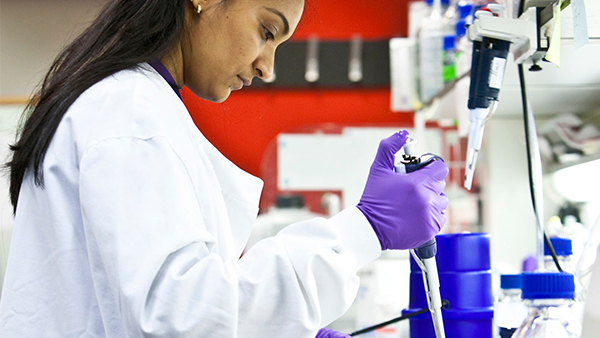Cancer Research UK is the world’s leading cancer charity dedicated to saving lives through research, influence and information. It’s the only charity fighting all 200+ types of cancer and its pioneering work is saving lives on a global scale.
Over a third of the charity’s life-saving research is funded by legacies, which help shape the future of medical research. This vital income source enables the charity to plan research funding long term and accelerate progress so that three in four people survive their cancer by 2034.
With the legacy market set to be worth £4.7bn by 2029, this is a pivotal time for Cancer Research UK to partner with philanthropists and their advisors to facilitate impactful gifts that will create a step-change in cancer research, driving progress and bringing hope to millions. 6% of the gifts the charity receives annually in Wills make up over 60% of their legacy income, emphasising the importance of attracting visionary philanthropists to their mission.
And of course, legacy giving is just one way Cancer Research UK works with wealth advisors and the philanthropists they serve. The charity partners with visionary supporters to fund a range of innovative activities across Cancer Research UK and has a team of philanthropy experts to help supporters choose the right destination for, and timing of, their gifts – whether that’s during their lifetime or in their Will.
In our latest article for theView, we speak to Samantha Devlin, Head of Product: Legacy Giving at Cancer Research UK, to find out more.
What led you to work at Cancer Research UK and what does your role entail?
I was attracted to work for Cancer Research UK after my partner was diagnosed with cancer. I was working in marketing in financial services at the time and really wanted to use my skillset to help make an impact. Knowing Cancer Research UK was the largest funder of research into cancer in Europe, I was pretty tunnel-visioned in that I stalked the website and secured a role managing the Free Will Service.
My current role safeguards the income generated from gifts in Wills. That is, realising income today through our case management team who work with executors (both lay and professional) to maximise the value of any charitable gifts. As per Charity Commission guidelines, the team are very experienced in tax efficiencies to maximise the income for all beneficiaries, not just Cancer Research UK.
The other part of my role is to look to the future and encourage more people to consider including Cancer Research UK in their Wills. This will provide the organisation with a sustainable source of income to allow us to plan and make decision around long-term funding into cancer research.
We sow the seeds of legacy giving at an early stage, with many of our wealthy legacy pledgers having given substantial lifetime gifts, for example, after the sale of their business. We want to engage people at the beginning of their philanthropic journey, inspire them to give regularly and help them see the huge impact they can have in leveraging life-saving science. We do this through tailored marketing and events, as well as one-to-one relationship building with supporters, solicitors, Will-writers and wealth advisors.
What does legacy giving mean to Cancer Research UK and why is it so important?
Over a third of our life-saving research is funded by legacies. Our legacy pledgers are visionaries, helping to create a brighter future for people with cancer across the globe. By leaving a legacy, you’ll power discoveries that lead to new and better ways to prevent, diagnose, and treat cancer.
Last year was incredibly tough – the pandemic continued to disrupt the lives of people affected by cancer, and significantly hamper our mission, our research, and our people. Legacies moved from funding over a third of our research to almost half as events were cancelled and fundraising in the community made impossible. Never has the value of gifts in Wills been more fundamental to our mission.
Every year, more than 125,000 people with cancer in the UK are treated with drugs linked to our scientists’ research – that’s three in four people who receive cancer drugs on the NHS. This incredible impact would not be possible without the generous supporters who share in our vision. The philanthropists who support us with both lifetime and legacy gifts understand that no other UK charitable organisation is as well-placed as we are to welcome major donations to convene global excellence, deliver transformational insights and drive radical change to drastically improve outcomes and quality of life for people facing cancer.
How can someone ensure they have all the necessary processes in place when considering legacy giving? What does Cancer Research UK do to help?
We would always recommend that you consult with a professional advisor regarding your personal circumstances however, we’re always happy to discuss the different ways we can accommodate donations to fund our research.
Our Gifts in Wills guide contains all the information you’ll need to write a new Will or amend an existing one. You can request a copy via our website: cruk.org/pledge and if you have questions, we have a dedicated team of local Legacy Relationship Managers who you can reach over phone or email at LPMs@cancer.org.uk
We partner with solicitors and will-writers across the UK who can provide independent advice tailored to your individual situation.
If you leave a gift in your Will, you may be able to reduce your inheritance tax liability. Gifts to charities are 100% tax-free and are taken out of your estate before tax is calculated. Since April 2017, if you leave 10% of your net estate to charity, after certain deductions your inheritance tax rate will be reduced from 40% to 36%.
Our philanthropy and planned giving teams can also provide further advice on a variety of ways to boost your lifetime donations; with a Gift Aid declaration, we can claim a further 25p from the Government for every £1 donated. And if you are a higher rate taxpayer, you can claim back the difference between the rate you pay and the basic rate on your donation.
We also run a nationwide Free Will Service which is available to write a simple will online, over the phone or face to face with a local solicitor free of charge. There is no obligation to leave Cancer Research UK a gift, although we hope, and most people do, consider this as an option.
Do you have any high-profile donors who have pledged a legacy donation for Cancer Research UK?
We have some very generous donors, and 6% of the gifts we receive annually in Wills make up over 60% of our legacy income.
Whilst some supporters prefer to keep their pledge private, we have some donors who have shared details to help support our vital research into beating cancer, one of which is philanthropist Alec Catt.
Alec left a generous gift left in his Will which supported Professor Ian Tomlinson, whose research group discovered that gene mutations could increase the risk of bowel, breast and prostate cancer. They identified that these genes were involved in repairing DNA damage, an insight that helped build our understanding of how genetic faults can cause cancer.
This discovery is now helping scientists develop methods to accurately predict cancer risk, so that people at high risk can be monitored more closely to detect cancer sooner if it develops. Detecting cancer early is a powerful tool to improve survival, as it allows doctors to intervene in the early stages when treatment is more likely to be successful.
Alec’s legacy not only allowed us to improve our understanding of how genetic faults can cause cancer, but also helped support Professor Tomlinson become a world-leading expert in his field and train the research leaders of tomorrow.
Why do you think legacy giving is increasing?
More and more we are hearing from supporters how they view philanthropy and donations are ‘social investments’ and like any investment, want to understand the impact their money can have on social outcomes. Particularly with gifts in will, supporters are literally looking at their own personal legacy and the impact on future generations.
We want to accelerate progress and see three in four people surviving their cancer by 2034. As the world’s leading cancer research charity, we are at the forefront of the global fight against cancer, bringing together millions of people who share our determination to beat it.
What is a residuary gift and how do I set one up to give to Cancer Research UK?
A residuary gift is a percentage of someone’s estate once fees and administrations are deducted. This type of gift is the most beneficial because it’s a percentage of your estate, rather than a fixed amount. This means it will retain its value and won’t be affected by inflation. Additionally, you might be able to reduce your inheritance tax liability. We advise supporters to work with their wealth advisors and/or solicitors to calculate the total value of their assets and then divide between their desired beneficiaries, always looking after family and friends first.
Is there anything else I should consider when setting up a legacy donation?
It’s really important to talk through your assets with a professional to ensure any tax allowances e.g. IHT, are recognised and the correct wording is always used so your wishes are correctly and clearly represented. At Cancer Research UK, we always advise that provision for family and friends are considered first before any charitable bequest and this is discussed with your advisor. This will minimise the risk of any challenges to a will and as such potentially deplete the amount available to distribute to beneficiaries.
What do you do with all the money that is gifted to Cancer Research UK?
All money bequested to Cancer Research UK goes towards our core purpose of beating cancer. We want to bring about a world where everybody can lead longer, better lives, free from the fear of cancer. A world where:
- Some types of cancer are effectively eliminated and many more are prevented from developing in the first place
- People who do develop cancer are diagnosed at the earliest possible stage so they can be successfully treated
- Treatments are more effective, kinder and more targeted, so people can lead better, more fulfilling lives
- Everyone shares in this progress equally, regardless of who they are, where they’re from or what type of cancer they have
What’s next for Cancer Research UK and your fundraising efforts? What other ways can I get involved to help your charity efforts?
As with many charities, Cancer Research UK has been impacted financially by the pandemic as many of our fundraising activities and events were cancelled. We had to reassess our research priorities and make some difficult decisions. The only restrictions around advancements in cancer research is the funding, not our capabilities. We have an ambitious yet realistic new strategy which looks to make discoveries, drive progress and bring hope to those affected by cancer.
Read more about our new strategy here.
We are looking to engage and partner with individuals and organisations to discuss how they can help whether that’s volunteering their time and expertise, making a donation or partnering in a number of ways such as joining our Free Will Service or attending one of our CPD events for professional will-writers.
To find out more about legacy giving at Cancer Research UK, please visit our website.


